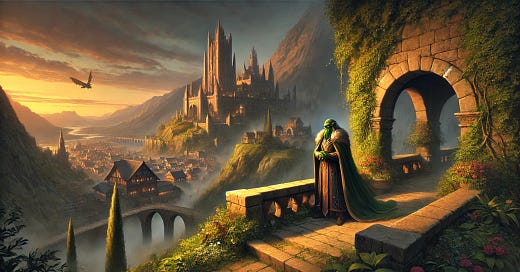A small garden perched on the west side of the High Keep overlooked the Orcish capital—Gor'molar. It was one of a kind, built and dedicated solely to the Highlord's pleasure. When the city’s architect first proposed the idea to Thalrish, the Highlord had been skeptical about whether he would ever use it. Yet, on this night especially, he appreciated the peace it offered.
As Highlord of the Orcish nation of Hasgram, Thalrish was a king in a society of warriors. But he was no warlord. He was an elected ruler and diplomat, a sovereign with an incredibly straightforward mission: to lead the Orcish people into a new era of prosperity and unity with the world they had once terrorized. His proponents often said he was uniquely qualified for such an undertaking.
And he was dying.
When Thalrish had first been elected, Hasgram had been like a lone stone in the desert, as influential as one. Now, it was the mightiest nation on the continent of Destgrar. With strong allies to the north, Hasgram had become a leader in agriculture and cultural development—not at all what the world expected from former slave-warriors who had terrorized the continent for two thousand years.
None now remembered the sparks that had ignited the inferno, but the world itself still bore the scars of the demonic invasion of Destgrar and the enslavement of the Orcish people.
It was undeniable that the Orcs had been responsible for the harrowing age that followed. Their idolatry and lust for power had heralded their doom. Yet it was also the Orcs who had risen against the demon lords, banishing them from the world and regaining their sanity in the process.
The branches above the Highlord rubbed together, whispering in the night breeze. Thalrish looked up as the silhouette of an Orc appeared in the archway.
“Come,” he said, his tone inviting rather than commanding. “What have you brought me?”
The Orc stepped into the twilit garden. “A report from the War Master himself, my lord,” Gaslar said. “Dregar has been executed, along with his cohorts.”
The news was as welcome as death ever could be. Thalrish nodded—not grimly, but without approval either.
“There is more, my lord. A situational report from Hro'gal.”
Gaslar presented a scroll with a broken seal, and Thalrish accepted it. His eyes scanned the report once, then again, as though he might extract some hidden meaning from the words.
“Ambassador Thoben considers civil war inevitable.” He spoke as much to himself as to Gaslar. Uttering the words seemed to lessen their weight, though they still burned in his mind.
While Hasgram prospered, the Orcish nation of Hro'gal had suffered from political upheaval over the past decade.
Hro'gal was the last remnant of the independent Orcish states that had sought autonomy from Hasgram. Some had eventually rejoined the nation, while others dissolved, their lands absorbed by other peoples. Yet the island nation stubbornly distanced itself from its mainland kin.
The cultural differences between Hro'gal and Hasgram outweighed any geographic factor. Hro'gal had been established on the island chain from which the Orcs had originally migrated. Its people still practiced the religion of the Orcs' primitive past, a faith that modern scholars believed had given rise to demon worship.
Although Thalrish was not the Highlord of all Orcs, he often felt responsible for them nonetheless.
“Ambassador Thoben should offer any assistance that may aid the people of Hro'gal,” he said, handing the scroll back to Gaslar. “I will approve any action she proposes.”
Gaslar hesitated. “Will the government even allow such aid to be rendered?”
“Perhaps not,” Thalrish sighed. “But it is Hasgram’s duty to support those in need.”
Gaslar bowed his head. Thalrish placed his hands on the Orc’s shoulders. “Your duty is to receive Captain Jarghost when he arrives at the capital for debriefing. Handle any administrative tasks as best you can until my return.”
“Of course, my lord,” Gaslar replied, though he hesitated before continuing. “But you still intend to make this journey, even amidst all this?” He hefted the report from Hro’gal, though his tone implied much more.
Thalrish smiled. He knew the dangers of isolation at the top. Too often, leaders ceased to hear voices that did not cosset or validate them, whether because they refused counsel or because none dared to offer it. A pragmatic leader, he believed, must insist that his decisions be scrutinized by those who would carry them out.
“You wonder why I am venturing into a place dedicated to exile and solitude at a time like this,” Thalrish said.
“And solace,” Gaslar added. “But I know of only one reason for your journey.”
“Hasgram has need of its greatest contributors,” Thalrish replied, “and not all of them reside within its borders.”
Gaslar asked bluntly, “Who are you bringing back?”
Thalrish looked at him sidelong. “Perhaps no one,” he said softly. Then, after a pause, he added, “Perhaps everyone.”




